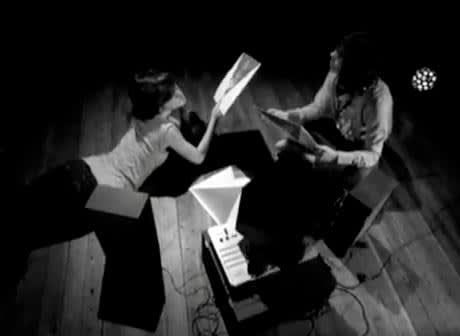Foxy, a bubbly, optimistic film by young filmmakers Trista Suke and Ellis Poleyko, uses a blend of documentary and fictionalized memoir to tell a personal story about what Suke calls her "deepest and darkest secret: my bald head."
Despite a couple of technical hiccups that are understandable for a student-produced work (the film is Suke's final thesis project at Ryerson University), Foxy uses a bouncy '60s Mod aesthetic reminiscent of Hairspray that's cheery and sweet in its narrative segments, and touching, honest interviews in its documentary segments, to great effect.
Foxy tells the story of Penny, a 20-year-old aspiring filmmaker (played charmingly by Suke herself), who is desperately trying to keep a secret from the world. Penny has alopecia, an immune condition that often results in hair loss. After seeing a poster for a screenwriting contest, Penny decides to create a big, splashy film to "come out" about her baldness, which she's been hiding for a decade via wigs and makeup.
The documentary portions of the film, which are intercut at specific thematic moments in the narrative, are heartfelt without being sappy, and often very funny in their frankness. The interview subjects — a mix of ages, genders and races — all have alopecia, and share honest, illuminating thoughts about beauty standards, the discrimination they've faced as a result of looking different, and the reality of how sex works when you're wearing a wig.
Developing a project around such a personal subject often lends a film some positive authenticity, but Foxy also gets creative with its filmmaking in a way that suggests that Suke and her team weren't just interested in presenting a straightforward memoir. The 1960s vibe is strong throughout the film with cute, funky set design (tiki pineapples abound), and on-screen animations lend a unique slant to mundane things like text messages. Overhead shots that follow Suke on her bike through the graffiti-covered streets of West Queen West, as well as lovely, meditative shots of Toronto sunsets, demonstrate a good eye for colour and light.
Foxy faces a number of technical issues, likely the result of how green the filmmaking team are. Conversations shot outdoors are often inaudible, and the audio during ADR'd scenes was slightly off. Overall, though, these are things that can be fixed with experience. When it comes to the core nuggets of telling a good story, though, Suke and Poleyko hit the right notes for an inspiring, fun, feel-good film.
(Independent)Despite a couple of technical hiccups that are understandable for a student-produced work (the film is Suke's final thesis project at Ryerson University), Foxy uses a bouncy '60s Mod aesthetic reminiscent of Hairspray that's cheery and sweet in its narrative segments, and touching, honest interviews in its documentary segments, to great effect.
Foxy tells the story of Penny, a 20-year-old aspiring filmmaker (played charmingly by Suke herself), who is desperately trying to keep a secret from the world. Penny has alopecia, an immune condition that often results in hair loss. After seeing a poster for a screenwriting contest, Penny decides to create a big, splashy film to "come out" about her baldness, which she's been hiding for a decade via wigs and makeup.
The documentary portions of the film, which are intercut at specific thematic moments in the narrative, are heartfelt without being sappy, and often very funny in their frankness. The interview subjects — a mix of ages, genders and races — all have alopecia, and share honest, illuminating thoughts about beauty standards, the discrimination they've faced as a result of looking different, and the reality of how sex works when you're wearing a wig.
Developing a project around such a personal subject often lends a film some positive authenticity, but Foxy also gets creative with its filmmaking in a way that suggests that Suke and her team weren't just interested in presenting a straightforward memoir. The 1960s vibe is strong throughout the film with cute, funky set design (tiki pineapples abound), and on-screen animations lend a unique slant to mundane things like text messages. Overhead shots that follow Suke on her bike through the graffiti-covered streets of West Queen West, as well as lovely, meditative shots of Toronto sunsets, demonstrate a good eye for colour and light.
Foxy faces a number of technical issues, likely the result of how green the filmmaking team are. Conversations shot outdoors are often inaudible, and the audio during ADR'd scenes was slightly off. Overall, though, these are things that can be fixed with experience. When it comes to the core nuggets of telling a good story, though, Suke and Poleyko hit the right notes for an inspiring, fun, feel-good film.
